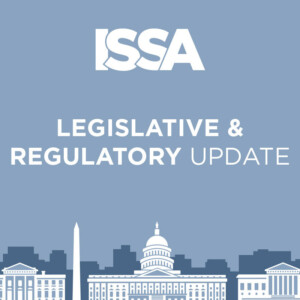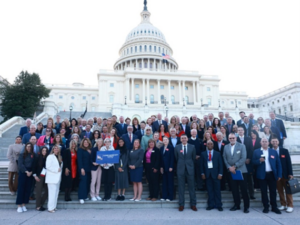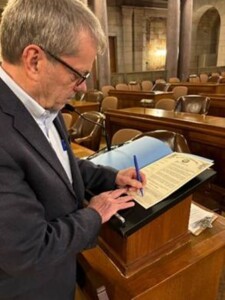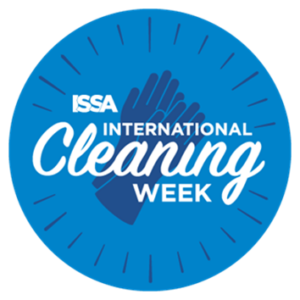ISSA Leg. & Reg. Update – ISSA Successfully Hosts 2025 Clean Advocacy Summit
 Welcome to the latest ISSA Legislative & Regulatory Update, a biweekly roundup of the public-policy issues currently impacting the full cleaning supply chain. This update touches on ISSA successfully hosting its 2025 Clean Advocacy Summit, urging Congress to expand workforce development, International Cleaning Week 2025 proclamations, and more.
Welcome to the latest ISSA Legislative & Regulatory Update, a biweekly roundup of the public-policy issues currently impacting the full cleaning supply chain. This update touches on ISSA successfully hosting its 2025 Clean Advocacy Summit, urging Congress to expand workforce development, International Cleaning Week 2025 proclamations, and more.
Want to stay informed about critical government affairs impacting the cleaning and facility-solutions industry? Sign up here to have the ISSA Legislative & Regulatory Update emailed directly to you every other week.
ISSA Advocacy

ISSA Successfully Hosts 2025 Clean Advocacy Summit
What it means: At this year’s ISSA Clean Advocacy Summit, March 31-April 1 in Washington, DC, expanding workforce development, streamlining the U.S. Environmental Protection Agency’s Office of Pesticide Programs, and ending period poverty took center stage as industry professionals, policymakers, and association leaders gathered to discuss and impact the legislative priorities for the cleaning and facility-solutions industry. In total, a record 140+ summit participants visited 170+ congressional offices representing 30+ states last week.
Why it matters: You don’t need to be a policy expert to make a difference on Capitol Hill—you simply need to show up and share your story. That’s the message John Nothdurft, Director of Government Affairs at ISSA, delivered during his opening remarks at the 2025 summit. It’s not just about today’s meetings, he said—it’s about building something for tomorrow. He welcomed summit participants to the long game of advocacy.
What ISSA is doing: Addressing 2025 summit participants, ISSA President Laurie Sewell emphasized that advocacy is a core pillar of ISSA’s mission. “It’s not something extra. It’s something essential,” she said, adding that the cleaning industry’s voice gets stronger every time professionals share their real-world experiences with policymakers.
Save the date! Next year’s ISSA Clean Advocacy Summit will take place March 23-24. Learn more:
- Cleaning Industry Prepares for the Long Game of Advocacy
- Advocacy, Inclusive Hygiene, & Innovation Will Shape the Future of Public Spaces
- Spotless Spaces Competition + Smarter Solutions: Tork Champions Inclusive Hygiene
- Coalition Calls for Reform of EPA’s Registration Process
- Clean Advocacy Summit Tackles Education & Urgent Labor Shortages
- Advocacy, Hygiene for All, and Innovation
- ISSA President: Advocacy Work Is Essential

Tell Congress to Expand Workforce Development
What it means: Couldn’t attend ISSA’s 2025 Clean Advocacy Summit? You can still help amplify our voice on Capitol Hill by taking a moment to ask your congressional delegation to increase the training and hiring of essential workers for the cleaning industry. Our 2025 summit participants asked members of Congress to support these bipartisan ISSA legislative priorities:
- Freedom to Invest in Tomorrow’s Workforce Act (HR 1151/S 756)
- Improve and Enhance the Work Opportunity Tax Credit Act (HR 1177/S 492)
Why it matters: As you likely know firsthand, the cleaning industry faces massive labor shortages and the demand for cleaning products and services remains high. ISSA supports these bills because they would provide valuable tax-advantaged resources to more workers pursuing training and education that diverge from a typical academic route, as well as help businesses like yours hire and retain more American workers.
What ISSA is doing: Ensuring that the cleaning industry has the trained workforce that it needs to meet the growing demand and emerging challenges is a legislative priority for ISSA. Take action now

Governor Jim Pillen signs Nebraska’s first-ever Cleaning Week Proclamation on March 19, 2025.
U.S. House, 23 States, Puerto Rico, Four Cities Proclaim International Cleaning Week 2025
What it means: The U.S. House of Representatives, a total of 23 states, Puerto Rico, and multiple municipalities across the country proclaimed March 23-29, 2025, International Cleaning Week, which celebrates the value of clean and the important, positive impact that cleaning has on public health, the environment, and our economy. Six states–Colorado, Indiana, Kentucky, Michigan, Nebraska, and Washington State–and four cities—Cleveland, Houston, Indianapolis, and Phoenix–proclaimed a Cleaning Week for the first time this year.
Why it matters: “International Cleaning Week is an important opportunity to highlight the hidden heroes who work behind the scenes to make sure our schools, hospitals, hotels, and workplaces are healthy and clean. It is great to have governors across the political spectrum recognize the essential nature of the cleaning industry by officially proclaiming Cleaning Week in their state,” said ISSA Director of Government Affairs John Nothdurft.
What ISSA is doing: “ISSA, the worldwide cleaning industry association, thanks Representatives LaHood and Krishnamoorthi for introducing this bipartisan Cleaning Week resolution in the U.S. House of Representatives, as well as the 20+ governors that also recognized Cleaning Week in their states,” said ISSA Executive Director John Barrett.
Puerto Rico, Washington State, and New York proclaimed Cleaning Weeks during International Cleaning Week. ISSA thanks the House of Representatives of Puerto Rico, Governor Ferguson, and the New York State Assembly, respectively, for this recognition and the ISSA advocates who submitted relevant requests, including Ashmyr Lugo Urbán, Meredith VanDoren, and Brant Insero. Learn more

ISSA Announces Winners of Inaugural Spotless Spaces Competition
What it means: ISSA is proud to announce the winners of its first-ever Spotless Spaces Competition, sponsored by Tork, an Essity Brand.
Why it matters: “The Spotless Spaces Competition exemplifies our industry’s unwavering commitment to excellence and innovation,” said ISSA Executive Director John Barrett. “These winners set the gold standard for cleanliness and hygiene, creating spaces where health, safety, and well-being thrive. Their achievements serve as benchmarks for the entire industry.”
The Spotless Spaces Competition was a key highlight of International Cleaning Week 2025, held from March 23-29. This global event underscores the cleaning industry’s vital role in protecting public health and driving economic impact.
What ISSA is doing: This exclusive ISSA-member benefit spotlights outstanding cleaning environments worldwide, celebrating the critical work of cleaning professionals in maintaining safe, healthy, and pristine facilities. Mark your calendar for International Cleaning Week 2026, March 22-28! Learn more
ISSA Releases Comprehensive Extended Producer Responsibility Summary
What it means: In response to the rapidly evolving landscape of Extended Producer Responsibility (EPR) laws across the US, ISSA announces the release of a comprehensive EPR Summary tailored specifically for the cleaning industry. This invaluable resource provides our members with crucial insights into the new regulatory requirements affecting packaging for commercial and household cleaning products.
Why it matters: As of 2025, five states—California, Colorado, Maine, Minnesota, and Oregon—have enacted EPR laws that directly impact “producers,” which are defined to include manufacturers, distributors, and importers of commercial and household cleaning products. These laws aim to reduce packaging waste and increase recyclability by shifting responsibility for waste management from municipalities to producers. However, the obligations created by these state laws vary significantly, making it imperative for manufacturers, distributors, and importers of cleaning products to review each state law. Understanding and complying with these regulations is essential for continued operations in these states.
What ISSA is doing: The EPR Summary is now available exclusively to ISSA members through our online portal. We encourage all members to review this critical document and share it with relevant teams within your organization. Learn more
Federal Cleaning Product Regulations Fundamentals Course
Join us for a series of intensive courses, on April 15, 22, and 29, designed to provide cleaning-industry professionals with a fundamental understanding of the complex regulatory landscape affecting their businesses. This course offers valuable insights into major regulations from the U.S. Environmental Protection Agency, U.S. Occupational Safety and Health Administration, and U.S. Food and Drug Administration.
Why Attend: Gain a comprehensive understanding of federal regulations and earn an ISSA Certificate of Completion and Credly Badge. Learn more and register
Establishing a Community of Practice and Advisory Council for Making Safer Choices for Cleaning
You’re invited to one of two free stakeholder meetings in New York and Pennsylvania held this month by our Making Safer Choices Project. The meetings’ purpose is to share survey results indicating gaps in current cleaning practices and opportunities to influence decisions.
Why attend: We hope that you will view this as a valuable opportunity to drive innovation and advance cleaning practices and improve the bottom line in your organization. Learn more and register
Additional Updates
Regulatory
Trump Announces Reciprocal Tariffs
President Trump announced 10% across the board, universal tariffs on imports from all countries, effective April 5. The 10% will rise to a “reciprocal tariff” rate for roughly 60 countries, effective April 9. This is the latest in several rounds of tariffs announced by Trump in his first few weeks in office.
Exemptions: The reciprocal tariffs will not apply to steel, aluminum, automobiles and auto parts (which already have a 25% tariff), copper, pharmaceuticals, semiconductors, lumber (products which Trump has suggested may be hit with a 25% tariff in the future), any other products that may be subject to Section 232 tariffs in the future, energy, and other critical minerals not available in the US. A full list of products not subject to tariffs is available here.
For Canada and Mexico, the existing fentanyl/migration International Emergency Economic Powers Act (IEEPA) orders remain in effect and are unaffected by this order. USMCA-compliant goods will continue to see a 0% tariff, non-USMCA-compliant goods are subject to a 25% tariff, and non-USMCA-compliant energy and potash are subject to a 10% tariff. In the event that the existing fentanyl/migration IEEPA orders are terminated, USMCA-compliant goods would continue to receive preferential treatment, while non-USMCA compliant goods would be subject to a 12% reciprocal tariff.
What’s next: According to the White House, these tariffs will remain in effect until the President “determines that the threat posed by the trade deficit and underlying nonreciprocal treatment is satisfied, resolved, or mitigated.” Trump has also said that the imposition of tariffs should be the start of the negotiation process with other countries. Treasury Secretary Scott Bessent warned other countries not to retaliate, stating that would lead to more US tariffs. On Friday, China announced that it will impose reciprocal 34% tariffs on all imports from the US beginning April 10. Learn more:
EPA Announces Changes to Pesticide Data Submission Process
The U.S. Environmental Protection Agency (EPA) announced improvements to simplify the process for companies submitting data to the agency as part of a pesticide registration package. Learn more
SEC Ends Defense of Climate Disclosure Rules
The U.S. Securities and Exchange Commission voted to end its defense of the rules requiring disclosure of climate-related risks and greenhouse-gas emissions. The rules, adopted by the commission in March 2024, create a detailed and extensive special disclosure regime about climate risks for issuing and reporting companies. Learn more
Trump Eliminates Increased Minimum Wage for Federal Contractors
After years of litigation surrounding executive orders establishing a minimum wage for federal contractors, President Trump signed an executive order revoking Executive Order (EO) 14026 issued by former President Biden on April 27, 2021. EO 14026 set the minimum wage for workers on covered federal contracts, entered into on or after that date, to US$15.00 per hour. That minimum wage has since increased to $17.75, JD Supra reports. Learn more
Trump Signs Executive Order to Streamline Federal Procurement
President Trump signed an executive order that centralizes federal government procurement under the U.S. General Services Administration (GSA), according to the Washington Times. The order rolls back agencies to the pre-acquisition reform era of the 1990s and puts the GSA in charge of purchasing all products and services that make up the ten areas of category management. This includes everything from office management and travel to security and protection, as defined by the Category Management Leadership Council. Learn more
Legislative
Senate Approves Framework for Tax Breaks, Spending Cuts
The U.S. Senate voted mostly along party lines to approve multimillion-dollar tax breaks and a spending-cuts framework, AP reports. Approval paves the way for Republicans in the months ahead to push a tax-cut bill through both chambers of Congress over the objections of Democrats.
Republicans framed their work as preventing a tax increase for most American families, arguing that unless Congress acts, the individual and estate tax cuts that GOP lawmakers passed in 2017 will expire at the end of this year. The Senate package also pulls in other GOP priorities, including US$175 billion to bolster President Trump’s mass deportation effort and an additional $175 billion for the Pentagon to strengthen the military. The framework now goes to the House of Representatives, where Speaker Mike Johnson (R-LA-4) could bring it up for a vote as soon as this week as he works toward a final product by Memorial Day. Learn more
Top Republican Leads Bill to Reassert Congress’ Tariff Authority
U.S. Senator Chuck Grassley, a senior Republican lawmaker from the farm-heavy state of Iowa, is spearheading new legislation that would reassert Congress’ authority over tariffs amid President Trump’s trade war escalation, according to Politico.
The measure, jointly introduced with Senator Maria Cantwell (D-WA), would limit the president’s power to impose tariffs by requiring the president to notify Congress within 48 hours of such an imposition and for Congress to explicitly approve any new tariffs within 60 days. The bill also would allow Congress to end any tariff at any time. Learn more
State and International News
FL Legislature Introduces Bills to Strengthen E-Verify Law
Several bills introduced by Florida legislators aim to strengthen Florida’s E-Verify law—particularly by eliminating the 25–employee minimum for use of the database—and include increased penalties for noncompliance, The National Law Review reports. They also add independent contractors to the definition of “employee.” Learn more
More States Requiring Paid Medical, Sick Leave
More states are passing or considering laws that require employers to offer medical or sick leave, according to AP. Advocates say these laws can reduce financial stress and make workers more productive. But some measures also stress employers, and the patchwork nature of different state laws can create frustration. Learn more
New Changes to CA’s Proposition 65 Short Form Warning Labels
In the final days of 2024, California’s Office of Environmental Health Hazard Assessment (OEHHA) promulgated amendments to Proposition 65’s safe harbor warning regulations. OEHHA had originally proposed new short form warning requirements in 2021, which stalled. OEHHA then restarted the rulemaking process in 2023, resulting in these final 2024 amendments, Food Safety Magazine reports. Learn more
Canada’s PFAS Restriction Strategy Adds to US Companies’ Hurdles
Attorneys are urging US companies to seize Canada’s offer to weigh in on the country’s announced strategy to work toward regulations for PFAS-containing products, according to Bloomberg Law. The Government of Canada announced that it intends to designate the entire class of PFAS as “toxic” under the Canadian Environmental Protection Act and progressively move towards restricting them. Canada’s multi-year, three-phase process starts with a data-gathering period ending on May 7. Learn more
















